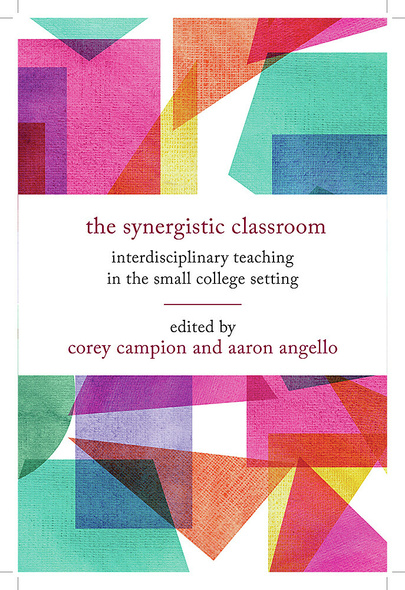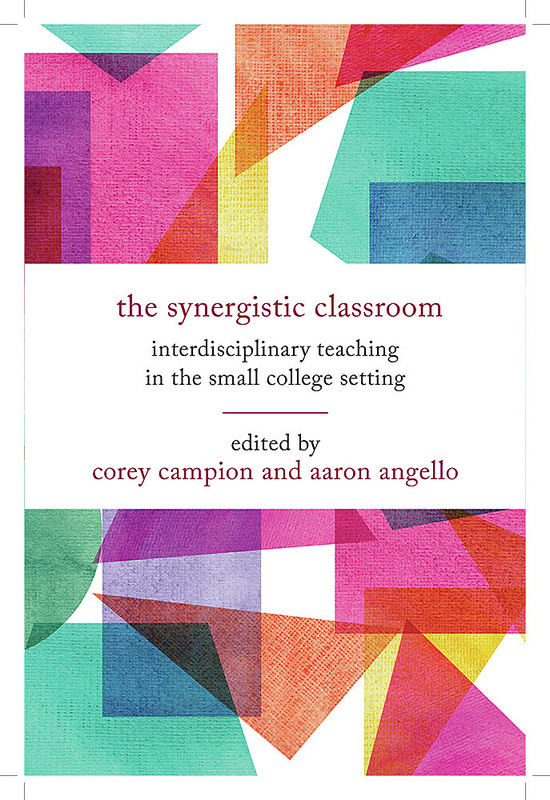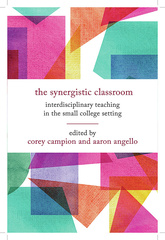The Synergistic Classroom
Interdisciplinary Teaching in the Small College Setting
Edited by Corey Campion and Aaron Angello
Rutgers University Press
Among the many challenges confronting the liberal arts today is a fundamental disconnect between the curricula that many institutions offer and the training that many students need. Discipline-specific models of teaching and learning can underprepare students for the kinds of interdisciplinary collaboration that employers now expect. Although aware of these expectations and the need for change, many small colleges and universities have struggled to translate interdisciplinarity into programs and curricula that better serve today’s students.
Written by faculty engaged in the design and delivery of interdisciplinary courses, programs, and experiential learning opportunities in the small college setting, The Synergistic Classroom addresses the many ways faculty can leverage their institutions' small size and openness to pedagogical experimentation to overcome the challenges of limited institutional resources and enrollment concerns and better prepare students for life and work in the twenty-first century. Taken together, the contributions in this volume invite reflection on a variety of important issues that attend the work of small college faculty committed to expanding student learning across disciplinary boundaries.
Written by faculty engaged in the design and delivery of interdisciplinary courses, programs, and experiential learning opportunities in the small college setting, The Synergistic Classroom addresses the many ways faculty can leverage their institutions' small size and openness to pedagogical experimentation to overcome the challenges of limited institutional resources and enrollment concerns and better prepare students for life and work in the twenty-first century. Taken together, the contributions in this volume invite reflection on a variety of important issues that attend the work of small college faculty committed to expanding student learning across disciplinary boundaries.
Unique and excellently written, The Synergistic Classroom illuminates honest yet hopeful realities about the overlooked system of interdisciplinary teaching in educational institutions. This comprehensive volume provides successful methods of teaching that can easily be implemented to enhance interdisciplinary courses.'
The Synergistic Classroom provides concrete examples of how to create interdisciplinary experiences that engage students in the curriculum, foster critical thinking, and support team work. This is a great exploration of the heart of professorship—to facilitate learning.
Unique and excellently written, The Synergistic Classroom illuminates honest yet hopeful realities about the overlooked system of interdisciplinary teaching in educational institutions. This comprehensive volume provides successful methods of teaching that can easily be implemented to enhance interdisciplinary courses.'
The Synergistic Classroom provides concrete examples of how to create interdisciplinary experiences that engage students in the curriculum, foster critical thinking, and support team work. This is a great exploration of the heart of professorship—to facilitate learning.
COREY CAMPION is an associate professor of history and global studies and the director of the master of arts in humanities program at Hood College in Frederick, Maryland.
AARON ANGELLO is the Sophie. M. Libman NEH Professor of Humanities at Hood College in Frederick, Maryland.
AARON ANGELLO is the Sophie. M. Libman NEH Professor of Humanities at Hood College in Frederick, Maryland.
Contents
Introduction: Building Bridges in a Land of Colleges
Corey Campion
Part I: Teaching Across the Disciplines
Chapter 1: The Anxiety of Interdisciplinary Teaching
Aaron Angello
Chapter 2: Challenging the Discipline: First-Year Seminars and the Benefits of an Interdisciplinary Model
Paul D. Reich
Chapter 3: More Than Just Another Core Class: The Interdisciplinary Composition Course
Patricia Marchesi
Chapter 4: Breaking Boundaries: Reflections on an Interdisciplinary Course on Race and Graphic Narrative
Patrick L. Hamilton and Allan W. Austin
Chapter 5: Interdisciplinary Interactivity: Team-Teaching App Design at a Small College
Christine Dehne and Jonathan Munson
Chapter 6: Honeybees and the Transdisciplinary Classroom: Bridging the Gaps between History, Environmental Science and Global Studies
Corey Campion and April Boulton
Part II: Programming Across the Disciplines
Chapter 7: Learning, Leading, and Succeeding: Collaborative Culture and Experiential Interdisciplinary Studies at Nichols College
Erika Cornelius Smith and Maryann Conrad
Chapter 8: Why Can’t It Be Both?: Supporting Students Across the Spectrum of Abilities and Ambitions
Julia Klimek
Chapter 9: From Chemistry to History to Psychology: Creating a Multidisciplinary Minor in Investigative Forensics
Christine D. Myers and Audra L. Goach
Chapter 10: Creating a ‘Space of Appearance’ through the Rollins College Foundations in Liberal Arts (rFLA) Program
Hilary Cooperman
Chapter 11: Flipping the Humanities Back into Mathematics
Winston Ou
Chapter 12: Arts in the Laboratory: A Multidisciplinary Approach to Honors Education in a Small College Setting
Lana A. Whited and Sharon E. Stein
Part III: Exploring Across the Disciplines
Chapter 13: Science and Cultural Competence: Incorporating Hispanic Migrants’ Knowledge and Experience in the Spanish Curriculum
Martha Bárcenas-Mooradian
Chapter 14: Authenticity and Empathy in Education: Team-Teaching “The Voices Project: Mental Health”
Amanda M. Caleb and Alicia H. Nordstrom
Chapter 15: Experiential Learning in the Rural, Small College Setting: Creating an “Appalachian Cluster”
Tina L. Hanlon, Peter Crow, Susan V. Mead, Carolyn L. Thomas, and Delia R. Heck
Chapter 16: “Hold my Piña Colada: Operational and Ethical Considerations for Interdisciplinary Experiential Learning Study Abroad”
Paola Prado and Autumn Quezada-Grant
Notes on Contributors
Index
Introduction: Building Bridges in a Land of Colleges
Corey Campion
Part I: Teaching Across the Disciplines
Chapter 1: The Anxiety of Interdisciplinary Teaching
Aaron Angello
Chapter 2: Challenging the Discipline: First-Year Seminars and the Benefits of an Interdisciplinary Model
Paul D. Reich
Chapter 3: More Than Just Another Core Class: The Interdisciplinary Composition Course
Patricia Marchesi
Chapter 4: Breaking Boundaries: Reflections on an Interdisciplinary Course on Race and Graphic Narrative
Patrick L. Hamilton and Allan W. Austin
Chapter 5: Interdisciplinary Interactivity: Team-Teaching App Design at a Small College
Christine Dehne and Jonathan Munson
Chapter 6: Honeybees and the Transdisciplinary Classroom: Bridging the Gaps between History, Environmental Science and Global Studies
Corey Campion and April Boulton
Part II: Programming Across the Disciplines
Chapter 7: Learning, Leading, and Succeeding: Collaborative Culture and Experiential Interdisciplinary Studies at Nichols College
Erika Cornelius Smith and Maryann Conrad
Chapter 8: Why Can’t It Be Both?: Supporting Students Across the Spectrum of Abilities and Ambitions
Julia Klimek
Chapter 9: From Chemistry to History to Psychology: Creating a Multidisciplinary Minor in Investigative Forensics
Christine D. Myers and Audra L. Goach
Chapter 10: Creating a ‘Space of Appearance’ through the Rollins College Foundations in Liberal Arts (rFLA) Program
Hilary Cooperman
Chapter 11: Flipping the Humanities Back into Mathematics
Winston Ou
Chapter 12: Arts in the Laboratory: A Multidisciplinary Approach to Honors Education in a Small College Setting
Lana A. Whited and Sharon E. Stein
Part III: Exploring Across the Disciplines
Chapter 13: Science and Cultural Competence: Incorporating Hispanic Migrants’ Knowledge and Experience in the Spanish Curriculum
Martha Bárcenas-Mooradian
Chapter 14: Authenticity and Empathy in Education: Team-Teaching “The Voices Project: Mental Health”
Amanda M. Caleb and Alicia H. Nordstrom
Chapter 15: Experiential Learning in the Rural, Small College Setting: Creating an “Appalachian Cluster”
Tina L. Hanlon, Peter Crow, Susan V. Mead, Carolyn L. Thomas, and Delia R. Heck
Chapter 16: “Hold my Piña Colada: Operational and Ethical Considerations for Interdisciplinary Experiential Learning Study Abroad”
Paola Prado and Autumn Quezada-Grant
Notes on Contributors
Index







